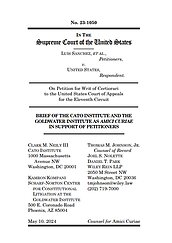Learn more about Cato’s Amicus Briefs Program.
The use of civil and criminal forfeiture by American law enforcement has exploded in the past fifty years, and the combination of perverse incentives, lax oversight, and complex procedures sets the stage for myriad injustices. In this case, Luis Sanchez and Jaqueline Palacios sent $9,000 with Carlos Cancari for the purchase of some electronics from a third party. Unbeknownst to them, Cancari was also carrying drugs, for which he was arrested in Miami. Cancari told agents the $9,000 did not belong to him and had nothing to do with the drugs, but the government forfeited it anyway. Cancari disclaimed any interest in the money as part of his plea deal, and the government kept the cash.
As innocent owners, Sanchez and Palacios filed a petition for return of the $9,000 under 21 U.S.C. § 853(n). The government then moved to dismiss on the hyper-technical ground that 21 U.S.C. § 853(n)(3) requires such petitions to “be signed by the Petitioner under penalty of perjury,” whereas Sanchez and Palacios had signed affidavits that were incorporated by reference into the petition itself. The district court dismissed their petition, and, widening an existing circuit a split on whether courts may or may not permit forfeiture petitioners to cure harmless pleading defects like this, the Eleventh Circuit affirmed.
Cato’s amicus brief in support of Sanchez’s and Palacios’ cert petition urges the Supreme Court to take this case and resolve the circuit split over whether innocent owners seeking to extricate their property from a criminal prosecution to which the property bears no relation should be permitted to correct trivial deficiencies in their pleadings that would result in zero prejudice to the government—other than depriving it of the opportunity to keep money that belongs to someone else.
In deciding a civil-forfeiture case just last week (Culley v. Marshall), various justices expressed concern about the substantive underpinnings of forfeiture law and potential procedural shortcomings in the way it is sometimes employed—even while rejecting the assertion that due process invariably requires a prompt preliminary hearing.
Cato’s amicus brief in Sanchez show the fundamental unfairness of the government’s in that case gamesmanship underscores the justices’ broader concerns about due process and points out that when the shoe is on the other foot—that is, when the government has committed some technical error like filing a forfeiture petition after the statutory deadline—it routinely seeks precisely the same kind of leeway that Sanchez and Palacios asked for in this case. (And of course, unlike property owners in most forfeiture proceedings, the federal government is a repeat player with access to counsel who are thoroughly familiar with the often highly complex and abstruse rules that govern those proceedings.)
Forfeiture has been criticized as “policing for profit.” The judiciary should not further exacerbate that policy’s myriad injustices by endorsing the government’s unseemly heads-we-win-tails-you-lose approach to forfeiture procedure or the erroneous reasoning of courts that have mistakenly embraced it.

This work is licensed under a Creative Commons Attribution-NonCommercial-ShareAlike 4.0 International License.

